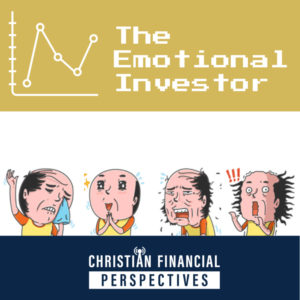Click below to listen to Podcast Episode 13 – The Emotional Investor
Subscribe: Apple Podcasts | Google Podcasts | Spotify | Amazon Music | Stitcher | RSS | More
Podcast Episode 13 – The Emotional Investor

Learn about the rollercoaster of emotions that may appear when it comes to investing.
This week, Bob and Mary Jo discuss one of the most fascinating aspects of investing – how emotions and FEAR can control investment decisions. More often than not, investor’s behavior is fueled by emotions. As a result, they tend to buy high and sell low which is the exact opposite of what you want to do.
The markets are like an elevator…ever notice how they soar to all new highs and then plunge to negative territory? Knowing what emotions correspond with market highs and lows is the first step to being aware of how to better control emotional decisions when it comes to your investments.
We have a wonderful chart that Christian Financial Advisors has been using for many years when educating our clients. It is a study of over half of decade of investor responses to extreme market conditions. If you are interested in our complimentary “Cycle of Market Emotions” chart, please contact our office at 830-609-6986 or visit our contact page.
HOSTED BY: Bob Barber, CWS® and Mary Jo Lyons, CFP®
Mentioned In This Episode

Mary Jo Lyons, CFP®, CKA®

DALBAR Quantitative Analysis of Investor Behavior
Want to ask a question about your specific situation? Schedule a complimentary 15 minute phone call.
EPISODE TRANSCRIPT
[INTRODUCTION]
Bob: Welcome to Christian Financial Perspectives, a podcast where we talk about ways to integrate your faith with your finances. This is Bob Barber.
Mary Jo: And I’m Mary Jo Lyons.
Bob: Are you ready to learn how to apply biblical wisdom to everyday financial decisions?
Mary Jo: Join us as we look at integrating your faith with your finances. If it’s your first time listening, welcome to our podcast, and if you’re a returning listener, welcome back.
[EPISODE]
Bob:
Romans 8:14-16, “For all who are led by the spirit of God are children of God, so you have not received a spirit that makes you fearful slaves. Instead, you received God’s spirit when he adopted you as his own children. Now we call him ABA father. Pour his spirit, joins our spirit to affirm that we are God’s children. In looking at this scriptural passage, fear, it actually makes us a slave, but as Christians, we are not to be fearful of our past, our present or future because God has it all and that’s faith and do we really believe that we belong to God and he owns it all. As Christians, we need to trust and biblical guidelines and know that they will work over time. There’s no room for doubt and this is where God has called us. As Christian advisors, we come along beside you and help you and keep you from making foolish, secular decisions if you’re following God’s guidelines and what do you have to be fearful of?
Mary Jo:
Oh Bob, that is so powerful and so on point with our podcast this week as we talk about the emotional investor. Another scripture that came to mind is 1 Timothy 6:17, “Command those who are rich in this present world not to be arrogant, nor to put their hope in wealth, which is so uncertain, but to put their hope in God who richly provides us with everything for our enjoyment.” In this week’s podcast, we’re going to be discussing one of the most fascinating aspects of investing, at least it’s fascinating to me, and how emotions and fear can control investment decisions. More often than not, investor’s behavior is fueled by emotions and as a result, they tend to buy high and sell low, which is the exact opposite of what we want to do. Investors, especially, react to the media hype and the noise that it generates. You know, Bob, I always look at this kind of like an elevator. Have you ever noticed how they soar to all new highs and then they plunge to negative territory?
Bob:
Yes, I do. I sure do. And the media loves using those kinds of terms.
Mary Jo:
They do. I don’t know where they come up with all these adverbs, but they’re used to instill fear and evoke emotion. It’s just a wonder we all don’t have whiplash as a result.
Bob:
You know, Mary Jo, when I start hearing all this stuff on the media, I go to my Netflix and watch the Andy Griffith Show.
Mary Jo:
Maybe Bewitched. I don’t know.
Bob:
Okay. All right. Some of those old ones that are fun. All right. Ecclesiastes 12:1 is another scripture I’d like to share before we get into this emotions and investing today. “Don’t let the excitement of youth cause you to forget your creator.” That is a real good one on point. I know, Mary Jo, that was one that you came up with. Investor behavior has been well documented and when it comes to money, we all tend to react with regret and over reaction, both on the upside and the downside. And this is why, historically, investor’s performance is usually worse than the market because it’s a timing thing. And casinos get this, they know that an occasional gambler will get lucky, but over the long haul, the house always wins.
Mary Jo:
I always get amused. We have some friends that really like to play Texas Hold’em, and they set aside a budget which is okay. But I kind of just laugh, because I know being an adviser that the house is always going to win, but they enjoy it. Bob, you mentioned how investor’s performance is typically worse than the market. There’s an annual study that advisors often refer to called the DALBAR Quantitative Analysis of Investor Behavior. It was recently published and confirm what we already know. Over the past 10 years, the average equity mutual fund investor has seen an average return of 4.9% compared to the S&P 500 return of 8.5%, and the average fixed income investor has seen an average return of only 0.48% compared to that of the Bloomberg Barclays aggregate bond index annual return of 3.31%. this same pattern has been illustrated year after year and shows how investor behavior is highly influenced by emotion. You talked about how investors performance is always typically worse than the market, and if you look back and you look for 20 years ending December 31st, 2015 the S&P 500 index average 9.85% a year, that’s a pretty attractive historical return. The average equity fund investor, however, earned a market return of only 5.19%, a little over 4% difference, and the average investor’s return is always worse than the market due to emotional reactions. Rather than buy low and sell high, they buy high and sell low because they just react with fear.
Bob:
Mary Jo, you and I have been around long enough that we can see this. I remember how investors got in 2008 and they begged me to get out and if I didn’t get them out when the market was down so much, they were going to go somewhere else. So, we were forced to move a lot of them out of the markets and then we missed that rebound. I, as an advisor, tried to keep them from doing it, but so many of them wanted to do that. One of the reasons for today’s podcast is we want to keep people from making those mistakes. We have a wonderful chart that we’ve been using around here for so many years when educating our clients at Christian Financial Advisors that we’re giving away in today’s podcast that illustrates the emotional cycles of investing and that’s what we’re going to share with you, all the emotional cycles that you go through investing. It’s a study of over half a decade of investor responses to extreme market conditions. So, the cycle of investing goes through a lot of different terms. The first one is going to be optimism and if you think about optimism, the definition of it is hopefulness and confidence about the future or the successful outcome of something, and this is one of the emotions that starts when the market is starting to move in an upward trend. You get that confidence about the future and you really feel good about it.
Mary Jo:
I think competence is the key there, and then the next emotion that investors tend to experience is excitement. It’s all going up. The market is rocking and rolling. The definition of excitement, a feeling of great enthusiasm and eagerness. Notice that the feeling is in there. Everything is, “How does it make me feel?”
Bob:
So far, we said hopefulness, confidence, great enthusiasm, eagerness, and then that next one is thrill. Bull market periods when the market seems to be going up indiscriminately. I mean no matter what you do, you can throw the darts at it and it’s going to go up. The definition of thrill is a sudden feeling of excitement and pleasure. It’s kind of like that sugar fix that you’ll get from some sweet tea or a big old piece of coconut pie. You’ll get that rush and you’re starting to get that rush and it overcomes you and your emotions now are starting to take effect.
Mary Jo:
Those endorphins in your body, and then we come to euphoria. You want to buy, buy, buy. It’s a period of overconfidence, actually, and the definition of euphoria, a feeling or a state of intense excitement and happiness.
Bob:
“Buy everything! I want all in!” is the next feeling. This is the point of the maximum financial risk when everybody wants to get in. Mary Jo, we’ve seen a lot of that in our real estate market here in Texas. I mean everybody thinks you just can’t lose. I mean my goodness has been good for 15 or 20 years. You can’t lose. That’s actually at the point of maximum financial risk is when everyone wants in, and the markets tend to be hitting peaks and valleys when buying and selling are at their highest, and you can see this based on volume at any given time.
Mary Jo:
The thing that came to my mind was the herd mentality. We as humans, we all perform like the herd. We want to do what everybody else is doing because it validates our decisions. It makes us feel better about them. But oddly, the next emotional feeling is anxiety. So, here we go with feelings again.
Bob:
This is when the market starts to go back down, right.
Mary Jo:
That’s right. The definition of anxiety, a feeling of worry, nervousness or unease, typically about an imminent event or something of an uncertain outcome.
Bob:
So, let’s say the market’s been going down for two or three weeks, and now all of a sudden you’re getting this anxiety, then we have denial. This can’t be, and you have regret. And that definition of denial is the action of declaring something to be untrue.
Mary Jo:
Ah, that’s right. Let’s go back. We’ve had optimism, excitement, thrill, euphoria, buy everything – I want all in, anxiety, and denial. Our next emotion is fear. Bear markets. Investors read stories about a bad economy and market volatility. They begin to experience fear regarding their investments. The definition of fear, an unpleasant emotion caused by the belief that someone or something is dangerous, likely to cause pain, or a threat. And this reminds me of another scripture that I think is relevant here. It’s from Psalms 34:4, “I pray to the Lord and he answered me. He freed me from all my fears.”
Bob:
Then we go into the next one as we’re going down, down, down. Desperation, what should I do? And there’s the definition of desperation is a feeling showing or involving a hopeless sense that a situation is so bad, it’s impossible to deal with.
Mary Jo:
So the next comes panic. The definition of panic – sudden uncontrollable fear or anxiety, often causing wildly unthinking behavior.
Bob:
Then the next one is I give up. Definition – cease making an effort, resign oneself to failure.
Mary Jo:
How many times have you heard clients say that? Get me out. I don’t want to be in anymore. Then comes hopelessness, despair, and the definition of hopelessness, a feeling or state of despair, a lack of hope.
Bob:
And here we go to the very bottom, and that is, “Sell everything I want out.” What’s interesting is it’s just the opposite of what we were talking about during the buy, buy, buy, which is the maximum financial risk and now it’s sell, sell, sell, which is actually the point of maximum financial opportunity. Listen to that. The maximum time that is the point at which you want to get in when everybody else wants out, and it’s going the opposite of the herd.
Mary Jo:
That’s it. The opposite of the herd. Once you hear about everybody else doing one thing, you want to be doing the other. And you know, I used to have a friend who was a trader on the Chicago Mercantile Exchange, and he always would say, “There’s always somebody else on the other side of that trade. So every time you want to sell, there’s always another investor wanting to buy because they see opportunity where you see fear.”
Bob:
So Mary Jo, this is going to take us into this, I guess this last part, right? Which is like, now what have I done?
Mary Jo:
Well, and then we have depression. Sell, sell, sell, the definition of depression, feelings of severe despondency and dejection.
Bob:
Okay, so here we go. Alright, we’re back in it. All this is so emotional, as you can tell, because now we start to see it come up a little bit. I have a little bit of hope, and there’s that feeling of expectation and a desire for a certain thing to happen, really hoping it’s going to come back up.
Mary Jo:
The next thing we feel is relief. The definition of relief – a feeling of reassurance and relaxation following release from anxiety or distress.
Bob:
Mary Jo, there’s so much emotion in this. It’s crazy, isn’t it? And then we start to hit back in. We’re starting to go back up. We’re getting that optimism. The definition of optimism – the cycle starts all over again, and that definition is hopefulness and confidence about the future or the successful outcome of something.
Mary Jo:
An interesting takeaway from this study, it’s something that I refer to as loss aversion. Simply put, when we make decisions, losses always loom larger than gains. We remember how the loss has made us feel a whole lot more than we remember how the gains made us feel, and this has huge implications for investors.
Bob:
Emotional investing is about timing. The lag between when an event occurs, when it is reported, and when the opportunity is gone can be a very short window. I want to read that one more time so you can get that. The lag, when an event occurs, when it is reported, and when the opportunity is gone can be a very short window. Typically, when you start hearing about it in the media, the opportunity has already come and gone. Remember, if you’re hearing about it when everyone else is hearing about it also, like the daily stock market report, it feeds off that activity occurring throughout the day and it can create a buzz for investors that can be outdated or short-lived or even nonsensical or based on rumors, and it’s best to avoid that noise. Mary Jo, I see this a lot in how they’ll talk about the futures in the morning, and you’ll see this huge swing in futures before the markets even open.
Mary Jo:
In anticipation. That’s why it’s so important to develop a relationship with a trusted advisor and preferably a Christian advisor. Together, you create an investment strategy that meets your risk tolerance and your timeframe. Again, you want to make sure that all your investments meet your risk tolerance and your timeframe, so the advisor’s role, our role, is to provide discipline and logic and reason. So if your situation hasn’t changed, then you should simply stick to your plan, with some minor tweaks along the way as market cycles indicate. We look at these as opportunities to rebalance your portfolio, sell the asset classes that are up, and add to those that are down.
Bob:
it. Isn’t that what you want to do? You want to sell when you’re up and add to those that are down, which takes the emotions out of it and the herd mentality away from that too.
Mary Jo:
Absolutely.
Bob:
Asset allocation is a strategy that most advisors like to use to help diversify an investment portfolio, and this idea is to spread your money across many different types of investments with the thought that these investments behave differently at different phases of the market cycle. This really goes along with the scriptural guideline that Solomon, one of the wealthiest men of all time, says in the word of God. Ecclesiastes 11:2, “Divide your investments among many places, for you do not know what risk might lie ahead.” With this approach, something is usually working in your favor because not everything will be down at once. Sub sectors of the market’s favor different market conditions, so a diversified portfolio may provide protection during many different kinds of markets. And this is what we call around here, modern portfolio theory, and it’s a science we use to help us manage our biblically responsible investment portfolios at Christian Financial Advisors. So to give you an example of this, let’s take a $100,000 investment that you’re going to put aside for 20 years to grow. And we take that $100,000, and we divide it into five different pieces. So $100,000 divided by five would be $20,000. We put $20,000 in one investment, and we completely lose it all. We put $20,000 and another investment and we just break even. We put $20,000 in that third investment, we make an average of 5% a year. We put $20,000…
Mary Jo:
Which is how much Bob?
Bob:
How much does it grow to? $53,000. And then we put $20,000 that would grow at an average of an 8% return over 20 years grows to $93,200 and $20,000 at 10%, which is our aggressive side of the portfolio. It would grow to $134,550. What’s interesting in this, Mary Jo, I’ve really described a diversified portfolio because you’ve taken your $100,000 and divided into five different pieces into five different areas. Even losing a fifth of that and only breaking even with another fifth, the 3/5 that made 5%, 8%, and 10%, your portfolio grew at an average of return of 5.7% or that $100,000 grew to $300,000.
Mary Jo:
What you’ve described is really just a diversified, balanced portfolio. It’s been my experience over the years that this is probably the ideal approach for just about everyone. It doesn’t pay to swing for the fences being extremely aggressive. When you have this balanced approach, you’re going to have less market swings, and those won’t be nearly as low as a result. This is our process and this process trumps emotion every single time. It’s the difference between winners and losers, and it’s actually called discipline.
Bob:
We’ve been giving a lot of definitions here today. I’d like to share the definition of discipline since we’ve been sharing so many today.
Mary Jo:
I think we need a reminder.
Bob:
Discipline. The practice of obeying rules or a code of behavior. Investing without emotion is easier said than done. And we understand that. Mary Jo and I understand that because we help our clients deal with emotions. While there are times when active investing can be profitable, data shows that staying the course through periods of volatility actually often results in better results.
Mary Jo:
There’s an interesting chart that I like to use that I think tells this story very well. It shows the short term ups and downs of the market and these are measured by rolling one year returns over a 10 year period and then you overlay that with a graph that reflects the rolling window of annualized 10 year returns. Now, this 10 year line, this line’s pretty steady and it doesn’t have a lot of jagged edges, whereas the line that reflects the rolling one year returns, it has lots of ups and downs. It’s a very jagged line. That’s a whipsaw effect, if you will. I’ll take that smooth ride every time. I’m not much for roller coasters, and I just want to ask our listeners, what road would they prefer to ride on and I don’t mean with your Mustang or your hot rod.
Bob:
I love charts, and you can see this on a chart. If you condense that chart to just add it on a monthly level or even a biannual level versus looking at it over a 1 year, 5 year, or 10 year level, that chart smooths out so much more. That’s why the day to day fluctuations will drive you crazy. You’ve got to look at it on at least a 200 or 300 day moving average. And even a short term period, if you’re going to get concerned about something that’s happening over three or four weeks, look at it over a 30 day or a 50 day moving average, not a one day average.
Mary Jo:
No, and I certainly stress the long haul, and I really encourage clients to just not listen to the noise every day. It’ll make you crazy. If you have money that you’re going to need in the short term, and by the short term, I mean the next one year or two years, let’s say you’re generating income, you want to pull that out of your investments and have that in virtual safety so that it’s not at risk. If the money you need to live on is not at risk, then you can let the other go and just kind of let the market do its thing because you have a longterm view with that other bucket of money.
Bob:
As we come to the end, we’ve been talking about all the emotions involved. We have this chart called the emotional investor, and if you would like to call us and get a copy of this chart, we’ll be glad to send it to you. You’ll be amazed at how it all works together when you see it on a chart, and I’d like to leave you today with this scripture in mind and encourage you. Psalms 46:1-3, “God is our refuge and strength, always ready to help in times of trouble so we will not fear when earthquakes come and the mountains crumble into the sea. Let the oceans roar and foam. Let the mountains tremble as the waters surge.” It kind of takes us back to the very beginning, Mary Jo, of where I was saying our God is not a God of fear, and if we’re following the Biblical guidelines for investing, we should not fear. And we encourage you to work with a Christian advisor to create an appropriate investment strategy that meets your risk tolerance and your timeframe and hold the course. If we can help you, please give us a call.
[CONCLUSION]
Mary Jo: You’ve been listening to Christian Financial Perspectives. Join us as we explore more about how to apply biblical wisdom to your financial situations.
Bob: To make sure you don’t miss any of our podcasts, you can subscribe to Christian Financial Perspectives on iTunes, Google Play, or Stitcher. To learn more about integrating your faith with your finances, visit out website at ciswealth.com or call 830-609-6986.
Mary Jo: That’s all for now.
[DISCLOSURES]
Comments from today’s show are for informational purposes only and not to be considered investment advice or recommendations to buy or sell any company that may have been mentioned or discussed. The opinions expressed are solely those of the hosts, Bob Barber and Mary Jo Lyons. Bob and Mary Jo do not provide tax advice and encourage you to seek guidance from a tax professional. Investment advisory services offered through Christian Investment Advisors Inc. DBA Christian Financial Advisors, a registered investment advisor.









